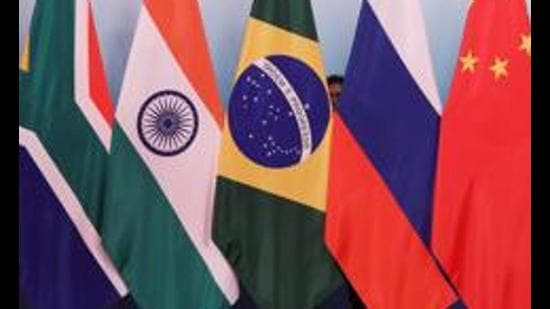At 15, BRICS has made incremental progress. But there is palpable disconnect too
To those in governments, holding a meeting of partner nations is a win in itself. If the meeting produces a consequential outcome, it is an achievement. However, to citizens, what matters is whether the agreements reached are being implemented and, more importantly, whether their implementation will bring some benefit to the people at large. So viewed, BRICS is a work in progress.
Celebrating 15 years, BRICS — Brazil, Russia, India, China and South Africa — countries held their 13th summit on September 9 virtually. Prime Minister Narendra Modi, as the chair and host, described the group as “an influential voice of the emerging economies”. He aptly observed that BRICS has several achievements to its credit, but without being “too self-satisfied”, it should strive to become more result-oriented in the next 15 years.

It is important to assess what BRICS has achieved so far, while factoring in its challenges and missed opportunities. The summit was convened under the shadow of the Covid-19 pandemic and the cataclysmic repercussions of the upheaval in Afghanistan.
South African President Cyril Ramaphosa spoke of knowing “sorrow and hardship”, while “we have also known solidarity and cooperation”. He underlined the world’s obligation to ensure “equal access to vaccines, diagnostics and therapeutics”. Chinese President Xi Jinping plugged for promoting “true multilateralism” and called for the building of “a community of shared future for mankind”. But to many in India, this lacked credibility, in light of the armed intrusion by the People’s Liberation Army (PLA) in eastern Ladakh last June, that took India-China relations to the lowest point since 1962.
While Afghanistan could be viewed by many in South Africa and Brazil as a peripheral issue, it is of vital concern to the Asian trio — China, Russia and India. The Taliban’s ascent to power in Kabul, the freedom of action that its allies — militant jihadi groups — will now enjoy, and the explicit projection by Pakistan of the new Afghan government as its “proxy”, have all combined to create widespread anxiety in the region. Indian diplomacy prudently leveraged it to craft a clear-cut BRICS position on this subject.
Thus, the top leaders committed themselves to “the priority of fighting terrorism, including preventing attempts by terrorist organisations to use Afghanistan as a terrorist sanctuary and to carry out attacks against other countries”. The Achilles heel of this formulation, however, is China’s apparent inclination to be in a hurry to recognise the Taliban government, support Pakistan fully in all its misadventures, and turn a blind eye to whatever damage extremist Islamic groups cause to other countries as long as they stay away from its troubled Uyghur province. The gap between Beijing’s words and action reveals the potential vulnerability of BRICS.
On the reform of multilateral institutions, the leaders endorsed the substantial statement negotiated by foreign ministers in June. BRICS presented its unified position in some detail, stressing its faith in “representative and effective multilateralism”. But concerning the expansion of the United Nations (UN) Security Council, all that China and Russia could do was to stick to their decade-old sentence, indicating that China and Russia supported the aspiration of the other three to play a greater role in the UN.
As one appraises the 15-year-long record of intra-BRICS interaction covering the three pillars of political, economic and social exchanges, there are indications of incremental progress. The group’s agenda now includes diverse realms such as customs, digital health, green tourism and space. India ensured that a special focus was placed on the deployment of digital technology to secure progress in the Sustainable Development Goals of the 2030 agenda. Among notable economic initiatives, the New Development Bank has drawn global attention, especially as it recently opened its doors to new members — Bangladesh, the United Arab Emirates and Uruguay.
To those in governments, holding a meeting of partner nations is a win in itself. If the meeting produces a consequential outcome, it is considered an achievement. However, to ordinary (but informed) citizens, what matters is whether the agreements reached are being implemented and, more importantly, whether their implementation will bring some benefit to the people at large. This yardstick should be used to measure the impact of BRICS meetings and a plethora of pacts produced by them. So viewed, BRICS is a work in progress.
Rajiv Bhatia is distinguished fellow, Gateway House and a former high commissioner to South AfricaThe views expressed are personal
Continue reading with HT Premium Subscription




